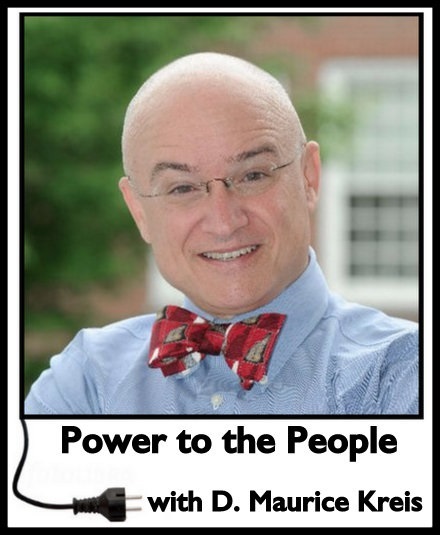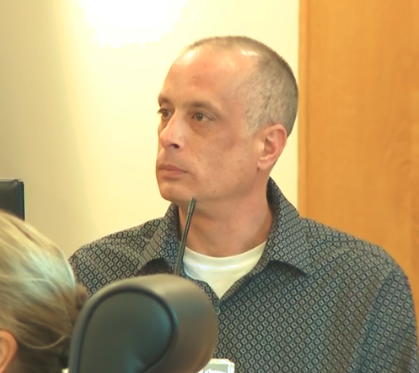Power to the People is a column by D. Maurice Kreis, New Hampshire’s Consumer Advocate. Kreis and his staff of four represent the interests of residential utility customers before the NH Public Utilities Commission and elsewhere.
By D. MAURICE KREIS, Power to the People
Earlier this year, at the conclusion of a public talk I gave in Dover about my work, a member of the audience raised her hand and asked me the secret of my success as Consumer Advocate.
Dodging the question of just how successful I’ve truly been as the statutory representative of New Hampshire’s residential utility ratepayers, I had a ready answer: Avoid all discussion of net metering.
Everyone laughed.
Conceptually, net metering is rather ingenious and, perhaps, even cute. Put some solar panels on your roof, wire them up so they’re connected to your house’s electric system and see if, at times when you’re producing more power than you’re using, the meter spins backwards.
It does! That’s what engineer Steven Strong discovered more than 40 years ago in Quincy, Massachusetts. As Strong told NHPR in 2017, his discovery of net metering was a perfect illustration of the maxim that “it’s better to ask forgiveness than to ask permission.”
I avoid discussing net metering not because I dislike grassroots subversion of utility hegemony – far from it. Rather, I avoid the topic because, as net metering has matured from monkeywrenching to moneymaking, the financial realities arguably pit one group of residential customers against each other.
On one side is the growing corps of people who deploy solar panels on their homes, in their backyards, or even at their businesses and feed their surplus power back into the grid. They get paid.
On the other side is everyone else. They’re paying.
The question, as with anything energy-related, is now much they should be paid. If you truly just spin the meter backwards (these days figuratively, because most meters are digital) you’re paying the net metering customer the full retail price of electricity – including all of its components (charges for energy, distribution, and transmission, etc.). For a residential customer of Eversource, that’s about 17 cents per kilowatt-hour.
The skeptics say that’s a ridiculously high retail price to pay for what is, after all, a wholesale product. By way of comparison, as I write on a late Tuesday morning in late December, wholesale electricity is trading in New Hampshire at the equivalent of 3.27 cents per kilowatt-hour.
Proponents of net metering contend that the comparison is unfair because a kilowatt-hour of net metered and locally distributed electricity is much more valuable than a kilowatt-hour produced far away by some honking big legacy generator like Seabrook (nuclear), Mystic Station north of Boston (natural gas), or Merrimack Station in Bow (coal, yikes!).
To be fair to the supporters of net metering in New Hampshire, they took a haircut in 2017. That’s when the Public Utilities Commission addressed the issue at the direction of the General Court and knocked the equivalent of about 4 cents off the otherwise-applicable retail rate for new net metering customers. (Pre-existing net metering customers were grandfathered.)
For the detail-oriented, here’s the fine print. The PUC eliminated 75 percent of the distribution charge, and all of the system benefits charge, from the net metering rate.) But 13 cents is still a very lavish price for wholesale electricity.
So, as the PUC decreed more than four years ago, the agency plans to embark on a “value of solar” study – a full-blown effort to figure out precisely what net metered electricity is worth to the grid. Seeking a consultant to perform the study, the PUC put out an RFP in March, got eight responses in May, but so far appears to have made no additional progress.
Meantime, the renewable energy advocacy organization Clean Energy New Hampshire (CENH) is not waiting around. CENH teamed up with Renewable Energy Vermont (a trade association) and Vote Solar (a national nonprofit) to commission their own value-of-solar study.
To do that, they hired the Massachusetts-based consulting firm Synapse Energy Economics. (Full disclosure: Synapse also does consulting work for my office, but on unrelated matters and involving different employees.)
CENH circulated the Synapse study in New Hampshire earlier this month. On December 18, Nathan Phelps of Vote Solar briefed New Hampshire’s Energy Efficiency and Sustainable Energy Board about the report.
Synapse concluded that so-called “behind the meter” solar power – i.e., the output to the grid from relatively small-scale net metering – is worth anywhere from 20.5 cents to 37.1 cents per kilowatt-hour. Phelps explained that the variations depend on how much value you assign to the value of avoided carbon emissions.
What this ignores, of course, is that in New Hampshire avoided carbon emissions currently have no value at all because the state has no binding carbon reduction goal. Leaving carbon out of the equation, Synapse estimated the value of net metering last year to have been 14.5 cents – still quite far north of the prevailing wholesale price almost all the time.
Phelps omitted any mention of a key development that occurred on November 12. That’s when the Vermont Public Utility Commission issued an order scaling back compensation for net metering in its state, after considering but politely rejecting some key assertions from the Synapse study.
“[A] significant portion of the energy savings attributed by solar by the Synapse Report are due to price suppression,” the Vermont regulators noted, noting that such estimates are “uncertain” and “represent a redistribution of value between different economic entities” rather than a “separate net benefit that should be included” in assessment of the value of net metering. That’s especially true, ruled the neighboring PUC, “when other, less expensive options exist for supplying solar power in Vermont.”
This is potentially a big deal given that, unlike New Hampshire, Vermont has been famously congenial to net metering. Moreover, the Vermont PUC commissioners are hardly apologists for legacy utility interests. Chairman Anthony Roisman came to fame in the 1970s by litigating against the construction of the Vermont Yankee nuclear plant. Commissioner Sarah Hofmann is a former ratepayer advocate. Her colleague Margaret Cheney is a retired Democratic legislator who is married to U.S. Rep. Peter Welch (D-Vt).
In the circumstances, one wonders how the Synapse report will be received by the New Hampshire PUC, to say nothing of the newly GOP-dominated Legislature. But this much I know: I’ve probably said too much on the subject of the future of net metering already.





